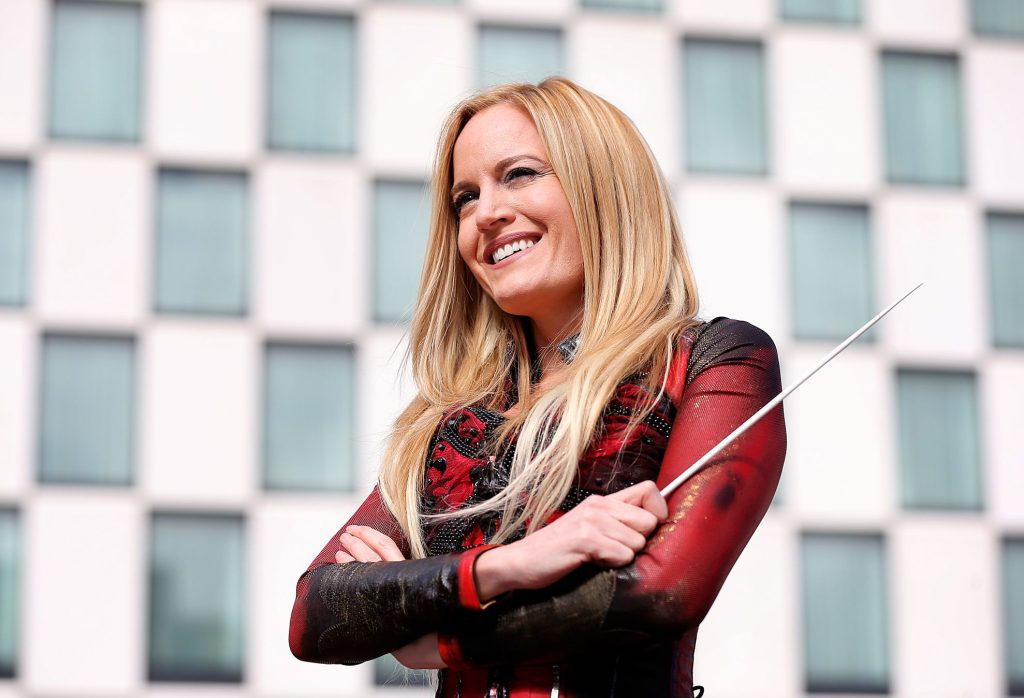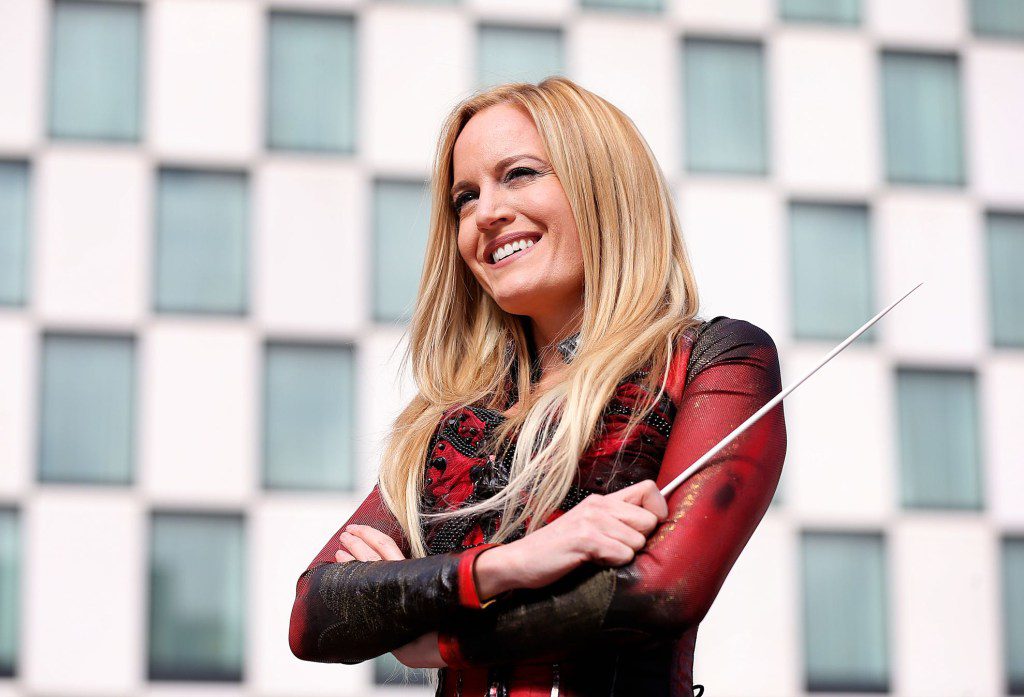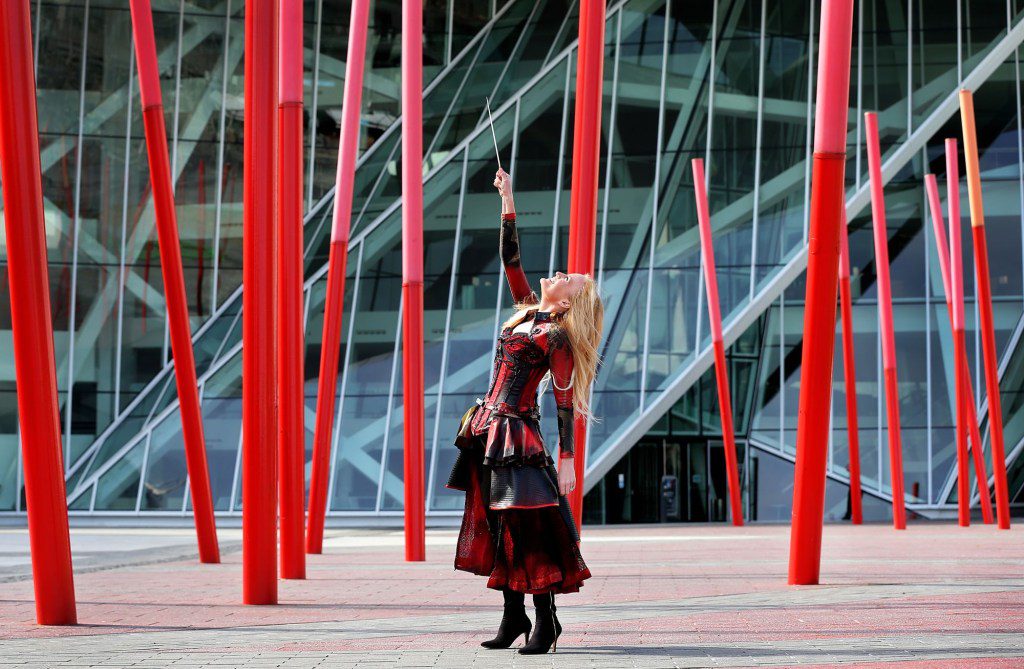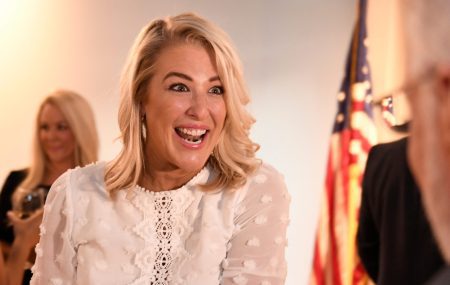GameCentral speaks to award winning female composer Eímear Noone, about the effect of AI on video game music and the hurtfulness of the movie Tár.
Five years ago, we interviewed Irish composer Eímear Noone, about her participation in Classic FM’s show High Score. However, due to her impressive history as a pioneering female composer who has contributed to a wide range of projects including World Of Warcraft and Overwatch, as well as the 25th anniversary celebrations for The Legend Of Zelda, we ended up discussing much more than just that.
Considering that the last time we spoke was before the emergence of Covid, it's evident that a lot has changed since then – especially her achievement as the first female conductor to perform at the Oscars.
In our recent interview, we ended up discussing various music-related topics, from the increasing opportunities for female composers, to the absence of synthwave in major games, the risks of AI, and the undue cruelty of the movie Tár.
The original reason for talking to Noone was a series of concerts in the UK, featuring music from various games and creators, but unfortunately the English dates have now been called off.
Tickets are still available for concerts in Edinburgh and Glasgow, though, through the website of the Royal Scottish National Orchestra (RSNO).
The program will include music from games such as The Last Of Us, Uncharted, World Of Warcraft, Mario + Rabbids, Fortnite, Kingdom Hearts, Horizon Zero Dawn, and God Of War Ragnarök, as well as a few surprises – including new works being revealed for the first time.
GC: I think the last time we spoke was about eight months before the pandemic…
EN: Oh, 2019, my god, things have changed so much. Wow. It’s a different world, isn’t it? It’s really a different planet.
GC: So, in a fairly literal sense, what have you been doing since then? Obviously, you’re doing this tour now, but it’s not your first one, is it?
EN: No, I’ve been organizing concerts like this for a long time. But this is my first sort of mini-tour under my own name with the IDG, which is really significant for me. And it just kind of shows that this music is maturing and it’s gaining traction and the audience, the UK audience, is fantastic for this music. Very, very generous, very attentive, and very supportive.
And it’s an audience I know quite well at this point, including the fact that I can look into the audience and then I’ll know most of the first two rows at sight.
GC: [laughs] Really?
EN: Oh, yes, yes. I mean, my first video game music concert in the UK was at the Hammersmith Apollo with the Royal Phil[harmonic Orchestra] in 2011, and I know that there are going to be people that were at that concert that are coming to the tour, and have come to everything I’ve done in the UK since and they are just wonderful.
Such a supportive audience and an audience that I will always serve no matter what I do musically. I’ll always come back, because I’m just so moved by how they treat the orchestra – in the moment, in the concert hall – and it needs to be sort of seen and felt. It kind of bowls the orchestra over, especially if it’s their first time experiencing this audience. It’s how I feel. I mean, I feel like whooping and going crazy and treating the orchestra like The Rolling Stones, but that’s how this audience treats them and it’s fabulous.
GC: I reviewed our previous conversation to avoid repeating myself. We talked about how Hans Zimmer was influencing video game music by rejecting recognizable melodies. I wonder if that's still the case after five years?
EN: You make a valid point. Music, like other things, goes through trends. In certain film genres like fantasy, action, and animation, we see a return to writing memorable themes. John Powell did a great job with How To Train Your Dragon series, bringing back big tunes to animation. I really admire his work.
In the gaming world, it seems that Japanese games, like Nintendo games, have fewer memorable tunes from later composers, such as [Koji] Kondo. When we work on Zelda, we have the main theme, but there are many other great themes across the franchise.
His gift is melody. When working on the album for Skyward Sword – Symphony Of The Goddesses, I noticed the abundance of tunes. I also wondered how Irish trad music ended up in there, especially in Wind Waker.
In the game we're currently working on, which is a triple-A game, it doesn't suit a big tune because of its different style. Games like Fortnite focus more on creating a feeling rather than a hummable tune.
GC: It's surprising that it doesn't have a recognizable theme tune.
EN: The music depends on what game developers want. They decide if they want a sonic identity that's reminiscent of the old school or if it feels too retro. It's driven by the vision of the game developer, directors, and producers.
GC: One thing that stands out about Nintendo is the strong jazz influence in much of their music. Japanese composers are less hesitant to explore other cultures, like the Irish instruments you mentioned. On the other hand, Western game composers often seem to mimic what's popular in cinema at the time.
You know, there's another factor at play here. You mentioning jazz is interesting because there's a different perception of trends in the West. Early TV music in Los Angeles was heavily influenced by jazz, which has a specific harmonic style. This influence comes from using classical musicians. My husband, who is a composer, has that jazz influence from early on. In the early days of TV, shows like Hill Street Blues and even Murder She Wrote…
GC: The unforgettable things.
EN: [laughs] Yes, exactly! There was a school of jazz composition in Los Angeles that many of these musicians went through, and I sometimes hear that influence in the Japanese music, which is really great and I really like it.
However, in Western music, it might be seen as old-fashioned, belonging to that time. So it's more about perception. I enjoy diversity and different sounds, but I often notice that influence in the harmony and orchestration, now that games use live orchestra.
I love what you're saying about Japan having so many cultural influences. My kids are big manga fans, and I heard a TV show from Japan with music that sounded like California rock in Japanese! It was so much fun, like Blink-182 but in Japanese.
GC: It surprises me that chiptunes and synthwave are rarely used in bigger budget mainstream games. There are exceptions, like Cyberpunk, but to me, synthwave connects 8-bit video game music to the modern day. You can hear it in something like the Tron Legacy soundtrack but not really in games, and I find that disappointing.
EN: I think developers may see it as retro, and if that's the style they want, it's a choice. But if people want something broader, it might be a problem. However, if desired, chiptunes can be integrated into the orchestra.
That's the era I grew up in, so it's fun. But the issue now is the perception of chiptunes as retro.
GC: One thing that has definitely changed since we last spoke is the issue of AI, which hasn’t been discussed much in music, but I imagine it poses similar challenges to composers as it does to visual artists?
EN: Yes, it will definitely impact music. My approach to technology has always been to use it creatively. We have already started using it creatively in video game scoring, not to create the score itself, but to work with a character’s movement in specific ways.
For example, when your character starts walking towards the door, then starts running towards the door, we input certain musical parameters with an element of chance built in, which can change depending on your speed. It's small things like that to use it in a creative way.
GC: Like a modern version of LucasArts’ iMUSE?
EN: A little bit, yes! That’s a good reference. But we have to be cautious.
GC: Certainly. And it's not just big, greedy publishers. Many of the recent cases have been small indie developers doing it to save time and money since they can't afford a composer or similar.
EN: Yes, definitely. I can clearly see how it could be achieved. And, truly, it is frightening and we need some laws there. We need to control this completely, for sure. So that we can use it in innovative ways. I can see, for example, the production music libraries being the first to go.
There are many composers who make a living by writing for music libraries, and there's enough of that music out there, and there are enough elements that an AI engine can assemble within certain parameters. Can you change the key and increase the speed by 10 BPM right here? Can you make it stop at this point, with a hit on the end, and so on. I can see how easily that can be done.
GC: It all seems so short-sighted. If you cheat these people and make them lose their job, what will you sample in the future? Will all art end up as this kind of inbred copy of a copy?
EN: As technology advances, the law needs to keep up. For example, YouTube still doesn't compensate composers for video music. They selectively don't pay for video game music if they're using your work in the background of a video.
GC: Do they do that for other music, right?
EN: They do for other music, but still not for video game music. For composers, budgets have decreased and then streamers don't pay what your regular terrestrial television stations pay to use creative work. So what's happening is music creatives are working excessive hours to make a living and stay creating for the public. And then there will be a fallout from AI, for sure. Definitely.
Truly, the only protection against it is to invest in your own unique voice as much as you can, to be as much yourself, essentially, as you possibly can. To explore everything that is different about you as a creative, which is what we should be doing as artists anyway. But that's very hopeful and very positive. But it's also somewhat naive.
So, we do need regulation. We do need entities like YouTube and the streamers to keep up with ensuring that artists can continue to create, because these structures are in place to keep us afloat while we're creating a project. And in-between projects, you're not talking about people who get a salary and health insurance and pensions and all of that. We've chosen a riskier path, but people shouldn't be punished for that or punished for creating something joyful.
Most of us, we're just happy to create and keep the lights on. Most of us don't need a specific amount of admiration. We just feel privileged and happy to do the work and share the work. And I do feel like that's how I contribute to my wider community. I'm not a doctor. I can't save lives, but I can at least maybe entertain you for an hour and a half, perhaps.
GC: OK, that’s all rather worrying but there is a happier subject we can discuss, since we talked about Shirley Walker last time.
EN: Ah, Shirely!
GC: It strikes me that the situation for female composers has got a lot better, in just these relatively few short years. I thought Natalie Holt’s work on Loki season two, for example, was fantastic.
EN: Yeah, yeah!
GC: But I’ve noticed a lot of other female composers’ names popping up recently, so there seems to have been some sort of conscious effort to encourage them?
EN: Yes, the industry has made a deliberate effort, and I appreciate that. I think we need more of it. The challenge arises when working in music teams because there's a lot of music to create in a short time. I struggle to build a team because I enjoy controlling every detail and adding my own touches.
Because of my background as an orchestrator, it's tough to let go of control. [laughs] But Natalie is fantastic. Pinar Toprak is also one, of course, Hildur Guðnadóttir… I believe affirmative action is very important.
GC: Hildur… her name sounds familiar, but I can't remember her projects.
EN: She worked on Chernobyl, the series…
GC: Wow, that had an incredible soundtrack.
EN: Yes, she composed for the Joker movie, which earned her an Oscar. When I perform, I ensure there are at least two other women on the program besides myself, because the audience deserves to hear their music. It's not just charity.
As you mentioned, Natalie, the work speaks for itself. It's highly skilled and detailed work, requiring massive amounts of hours and a major investment in skills. And then there are the gender issues.
There are pioneers, these few exceptions, but to join a music team, you need to be in a confined space putting in long hours to meet deadlines. We need more women bringing in younger women as assistants and learning the craft. There's so much to learn on the job.
I'm fortunate to work and live with a composer who's more experienced than I am, my husband Craig. So, we have daily discussions about the score and how to approach scenes and orchestrate. We even compose for each other, trying to make the other laugh or create something cool. We motivate each other.
The MeToo movement was important, but people are cautious on teams, especially when working long hours. Many composers work from home. Many factors are making it harder for young women composers to join these teams, such as tighter deadlines, and the need for a team to deliver on time.
You need a leader and support, or else… three hours of music in two months, fully orchestrated… A pop song lasts three minutes, you know? So, it's an immense workload. That's why at the end of a movie, you see a list of names. For young women in the industry, I believe established individuals need to ensure there's a place on these teams.
Everyone needs to contribute to addressing the imbalance. It's still quite skewed. It's better than Shirley's time, but it's still saddening because she was such an influential figure.
GC: Can you tell me what you’re currently working on?
EN: I cannot reveal the name of the game, but it's a high-quality, it's…
GC: Is it Half-Life 3?
EN: [laughs] No, it's a different style from what I'm usually known for. It's really amazing. I absolutely love the game, the story's very profound, it's… I can't say more about it, but it's set to be released early to mid-summer, so I will be able to discuss it soon. As soon as they've announced our involvement. [We're still not sure what this is – GC]
GC: How much information do they share with you, as a general rule, about games, especially when they're trying to keep them secret? I thought they only revealed the minimum, but you seem to be suggesting that's not the case?
EN: No, we have to be involved in understanding what the lore is and the story is, and the gameplay, and how it looks and everything like that, because we have to score it.
GC: I'm sure you do; I just wasn't sure they'd appreciate that fact.
EN: We understand the importance for the company to keep things secret. You don't want to be the one that ruins the surprise. I'm sure there are many business reasons for that, but I am glad to be completely unaware of them. I just think for the public it would spoil the surprise.
I find the gaming world is much more secretive about things than the film world. But at the same time, I don't want to mix up my NDAs, so I'm not saying anything at all about anything. [laughs]
GC: Did you see The Game Awards in December? We vote for them but it's always frustrating when your nominations don't make the cut. Starfield, for example, is not a very good game but the soundtrack is great. But it wasn't even on the short list, which makes me wonder if these things are being judged purely on their own merits or if they're being overridden by the game's wider reputation, for good or ill.
EN: I'm performing Starfield this year, live. Yeah. Yeah. I admire Inon [Zur]’s work. I'm like, you know what? I really like the music. So it's going in the program. I know the fans really like the music and I love it and it, it's worth performing. I don't really care whether it wins awards or not it.
All of these awards things are very political and I just don't have the space in my brain for it. I have to say I don't have any bandwidth for it at all. I am surprised Starfield didn't get nominated. That's really surprising.
So yeah, awards, music awards… all kinds of awards. They're fun and stuff, but I take it with a pinch of salt, really. At the end of the day, for me, it's my ears and how the music makes me feel. And if I think it has a life on the stage and the audience will react to it and enjoy it, I don't really care how many votes, or whatever, it got. Because I feel like if I'm reacting to it this way, then the public is going to react to it that way, or a certain segment of the audience is going to react to it that way at least.
So it's kind of a gut, visceral reaction to the music. That's kind of what I go by, which sounds really…
GC: If you've come this far, I think it's reasonable to assume you know what you're doing.
EN: [laughs] It's really cool and strange at the same time, when you're performing your friend's music, because you know them on one level and then you get to know them through their score, which I have to spend quite a bit of time with in order to perform it. It's a different level, a different dimension.
GC: One thing that emphasizes the significance and influence of video game music is… I’m always surprised by how frequently someone will mention the soundtrack as one of the best aspects of a game or will even suggest a game solely for the music – even if they don’t particularly enjoy the gameplay.
EN: It’s the same connection composers have had with other artists throughout history. It’s a cooperative medium. People express things like, ‘Oh, video game music, it’s being taken more seriously, finally’. And I think, you know what? Every genre of music throughout history has experienced this when it’s new. And then what happens is the best of it remains. But there’s a large amount of music that’s been created to give us the famous classical pieces that we know and perform today. That’s the material that’s survived. And it’s going to be similar with film music and it’s going to be the same with game music.
This is as it always has been, this is not a new situation. Game music is relatively new and it’s evolving into its own genre, separate from film music. But it’s still evolving. And the best of it will endure. But in order to get there, we, as artists, create a large amount of work and then wait and see what remains.
GC: Actually, I remember an instance recently. I was looking up lists of favorite video game music and I saw something from Diablo and I kind of turned my nose up at it, because I don’t really like that franchise. But I got curious and listened to it, and it was actually really good – even completely out of the context of the game.
EN: I contributed to that!
GC: Oh! Thank goodness I said I liked it.
EN: [laughs] I contributed to Diablo 3.
GC: I think it was Diablo 2 I listened to, but I got the impression it was a recurring theme. I forget the name… [It was Tristram – GC]
EN: Here’s an interesting fact: Andrew Hozier was in the choir for Diablo 3!
GC: Really? His stuff is great. I first heard him… they used In The Woods Somewhere in one of the trailers for Dark Souls 3.
EN: He has a song in Ragnarök as well, so that’s really beautiful that he composed with Bear McCreary.
GC: Just one last thing I wanted to ask you, have you seen the film Tár with Cate Blanchett?
EN: I have not. It’s a little too close to home for me.
GC: I can imagine, given the ending.
EN: Well, I know some people involved with the film, so I wondered about that myself. I did.
GC: We shouldn’t reveal the ending, but it seemed very relevant to you. Not on a personal level, but at an industry level…
EN: Well, on a personal level as well. I mean, I do know people involved with that film, so that kind of was very strange for me. And I come from a very classical background, and I choose to serve this audience because I think it’s important. And I found that hurtful and I found it quite unnecessary.
I also found the character embodied every stereotype of every challenge I’ve encountered in conducting over the years, and none of it was carried out by women. I didn’t recognize that character as being a woman.
To me, I don’t see… it’s such a big deal for us to get opportunities. None of my colleagues or I will ever risk that kind of behavior, professionally. We can’t, we can’t afford it. And I felt like the character wasn’t relevant to anybody I know. And I know a lot of women conductors, but I found the end very hurtful and unnecessary.
GC: It did seem oddly specific and unkind.
EN: I did inquire because this is an area that I have led in. I did ask if it was personal. It felt personal to me, and I don’t understand why I do everything I can to support women conductors on the classical level, crossover level, opera, the Oscars. It just felt personal. And thank you for asking, because nobody’s asked me, and I didn’t recognize that character in any of the women that I know, because we can’t just can’t risk that kind of behavior.
GC: I was going to make that point when we were discussing female composers. Even after they get their foot in the door, they’ve still got the problem that if they make one mistake, that’s it. They’re out.
EN: If you make a mistake as a woman, you’re making it for all women and that’s something. So no, we can’t afford to act the way Lydia Tár acted. That’s not even remotely believable to me, based on my experience of my colleagues, who they are, how they treat the orchestra, how they treat their colleagues, how they treat each other. It’s just not a recognizable situation to me.
And I did find the ending personal and hurtful, and I feel what’s wrong with bringing joy to the general public for a couple of hours here and there? What’s a negative about that? It is for me, such an honor to serve that audience with passion and with joy because that’s what they give back to me.
And you know what, the amount of hours, the skill level, the kind of work that we put in to do this, to serve the public is enormous. And it’s not to be… I later read that the character was originally created to be male, and that made more sense to me. I couldn’t understand it. Basically, any woman that is conducting, that’s working at all, it’s a huge achievement. And to denigrate that, I heard from so many people about that. And it’s a pity, it’s a real pity.
One of my passions is in addressing that kind of snobbery and elitism in music, because I feel that’s a barrier. It’s a psychological and social barrier to the general public. And I think the orchestra is such a treasure. We need to be sharing it in the most unintimidating and inviting and inclusive way we can.
Maybe it’s the Irish thing, where I have an anaphylactic reaction to snobbery and elitism, but I think it’s a great honor to bring joy to the general public and the gaming public. And I take it very seriously, I would say. So thank you for asking.
GC: Well, I feel bit off for mentioning it now, I’m sorry. Especially as it means we’ve ended on a downer. Err… in one sentence, can you say which piece of music you’re most looking forward to in the concert?
EN: Oh my gosh, I can’t say that because so many of the composers are dear friends. But I will say there is nothing like the level of vulnerability and communication when I perform something that I’ve written on my own, in my own little room, for the public and I can communicate my story and who I am and where I stand and how I feel through music to people right there in that moment.
There’s nothing that comes close to that experience because it’s so vulnerable. And yet it’s such a privilege and you hope that you can reach somebody in that audience on some level that’s beyond words, and that’s the greatest honor.
GC: That is a much more cheerful way to finish.
EN: I am grateful for it, David.
GC: I apologize for the extended duration, but I truly liked that.
EN: Likewise, likewise.












